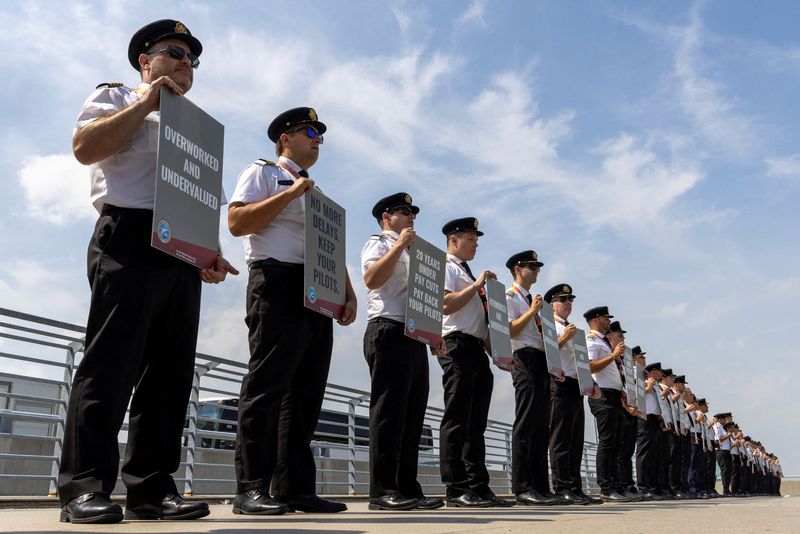By Allison Lampert, David Ljunggren and Rajesh Kumar Singh
(Reuters) – Canada is reluctant to force Air Canada pilots back to work if they go on strike, a government source told Reuters this week, even though Ottawa moved to end it earlier this month to the work stoppage at the country’s two railways.
Air Canada’s estimated 5,400 pilots, who want the airline to offer wages close to those of their American counterparts, said Friday they would strike as early as September 18 if necessary.
Their 10-year contract expired nearly a year ago and no negotiations are planned, the pilots said. If a strike continues, the inconvenience for travelers and economic damage will increase.
The Air Line Pilots Association, which represents Air Canada pilots as well as those of most U.S. airlines, said it fears federal intervention as happened on the country’s two main freight railroads. The government source said Ottawa is committed to collective bargaining and would not be happy about using its power to end labor disputes.
Labor Secretary Steven MacKinnon, who ordered an end to the rail dispute, told union workers Wednesday that his hand had been forced by the extreme economic fallout from the rail shutdowns. The Teamsters union is challenging the decision in court.
“We were in exceptional circumstances,” he said.
The two railway companies had an effective duopoly. Air Canada controls approximately 44% of the domestic seat capacity, with the remainder distributed among at least three other airlines.
Air Canada’s reluctance to intervene may also reflect political considerations. Prime Minister Justin Trudeau’s minority Liberal government is dependent on support from the pro-union New Democratic Party in parliament. The Liberals also want to win union votes in the run-up to elections at the end of October 2025.
WAGE GAP
Air Canada pilots have demanded wages closer to their counterparts at airlines such as United Airlines and Delta, although neither the Canadian airline nor its pilots have announced specific pay proposals.
United’s pilot contract, ratified in September 2023, increased salaries by about 42% and is estimated to cost the Chicago-based airline more than $10 billion over four years.
Pilots at other U.S. airlines have also negotiated big pay increases over the past two years amid a travel boom and pilot shortage. But demand for flights has declined and profits are under pressure.
Air Canada, which advertises salaries for senior captains of up to C$350,000 ($259,567) a year, said Thursday it plans to reach an agreement that recognizes pilots’ contributions but “also takes into account travelers’ increasing reluctance to accept higher pay airfares. ”
The Montreal-based airline’s revenues are already weakening. The company cut its full-year earnings estimates by 18%. Analysts at Raymond James estimate that a 5% increase in pilot wages will increase Air Canada’s costs by C$70 million.
Air Canada pilots have said they received an annual pay increase of about 2% under their old contract after return-to-work legislation prevented a strike in 2012.
A Reuters comparison of wages under United’s latest contract and Air Canada’s expired contract, which remains in place for now, showed that United pilots at all levels earned higher hourly wages. But the disparity was greater among junior pilots.
For example, a third-year first officer at United flying the A320 narrowbody aircraft earns $196.03 per hour, compared to C$81.02 per hour at Air Canada.
“Air Canada has received a reduction in the labor of our pilots,” said Charlene Hudy, president of the aviation union.

Commercial aviation strikes are rare in North America, but effective. A dispute between Canada’s WestJet Airlines and its mechanics was resolved in a day after their union vowed this summer to strike until they reached an agreement following government attempts to order binding arbitration.
($1 = 1.3484 Canadian dollars)


